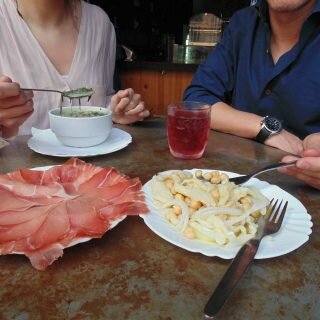When you visit Porto it´s very likely that you come across with some Tunas. You probably wonder what are those young people dressed with black uniforms, capes and going around with instruments! We spell it out for you…
Portuguese music and the students: The Tunas
When having a look at Portuguese music, one of the most fascinating topics that is definitively worth a visit is the Universe of the Academic Groups, these are musical groups attended by University students. The common identifying trait to all these groups is the attire the musicians wear: the traditional academic uniform, which is composed of a classic outfit (generally a black coat worn over a black vest, white shirt and black tie, paired with black pants, although there are regional variations across the different universities around the country) and a black cloak. A distinctive presence, you may be taken by surprise coming upon one of these groups around our city’s streets. There are although different kinds of Academic groups, each one with their own musical identity. For instance, a big core of these groups play what is probably the most well-known Portuguese kind of music: Fado.

What is a Tuna?
As others have put it quite well-summarized, Tunas include “…every permanent initiatory musical assembly of students of joyful life and bohemia tied to an academic centre, whose virtuosity resides in the plectrum instruments and in their outfit, usually enfolded in a cloak, that overtly identifies them.” (in Tunae Mundi: http://tunaemundi.com/index.php/nosotros/que-es-la-tuna. Félix O. Martín Sárraga). Indeed, the Tunas much like the student groups of Fado, are not just defined by their music, which is made up of several acoustic string instruments (guitars, basses, mandolins and a couple more) and percussion for the most of it, but also by the spirit that makes them up. Whereas Fado is characterized by a deep melancholic feeling, a sensation of longing that we place into a word, saudade, the Tunas go pretty much the opposite way. Festive, bohemian joy-loving musicians, Tunas go around streets and stages all over, dazzling crowds with regional ballads or songs brought in from abroad, singing and enchanting as roaming troubadours, some of them playing their own original arrangements. And as you find male groups of students in the universe of the Tunas, nowadays you find equally as many groups entirely made of women. All of this combined, make these groups so richly diversified, yet at the same time hard to define musically.

The Tunas in Porto
The Tunas have been around in Portugal ever since the end of the 19th Century. It was a phenomenon that started in our neighbouring country and quickly moved across borders into here. That we know of, there were different Tunas or Estudantinas, as some of them are also known, present in the cities of Lisbon, Coimbra (where you find the oldest University in Portugal and, therefore, highly relevant in the academic scene) and precisely here in Porto. In fact, newspaper records both in Portugal and Spain from 1890 detail the journey of an academic entourage on the way to Spain, made up of three distinct groups, leaving from the city towards Madrid and going through the academic city of Salamanca. Records diverge as to where these groups originally came from, but evidence strongly suggest that they could have been from Porto, as a part of the then esteemed Estudantina Portuense, which indeed took in students from 3 different groups.
As the years went on by, the Tunas and those attending them established quite the reputation with the people of Porto, not so good a one although. Because of their festive, libertine lifestyle, many of these students were actually seen as scoundrels, vagrants who cared for nothing more than partying. In fact, even on dictionaries, both Portuguese and Spanish, the word ‘Tunante’ was used to describe an individual who was untrustworthy, deceiving and of ill-intent, for many years. Newspapers of the time around the city, even used titles like ‘Um tunante’ to account for runaways who had escaped from their parents’ homes and were caught roaming in the streets. A harsh reputation, no doubt, but thankfully these students have been doing a fine work changing that idea for the better, conquering the hearts of audiences all over the country and if you give them the chance, perhaps they will win you over too.
Besides showing you the city we will talk about Porto´s culture and way of life! This is just an example of what you can learn from us… ;) Book now!



